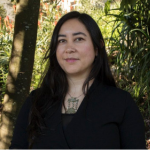The Human Rights Institute proudly offers three programs to provide graduate students focused on human rights with funding.
Dissertation Writing Fellowship
In an effort to support UConn graduate students writing doctoral dissertations with a human rights focus, the Human Rights Institute will select one $5,000 dissertation fellowship awardee for the 2023-24 academic year.
2023 Dissertation Writing Fellowship Recipient
 |
Eilyn Lombard, Ph.D. Candidate, Department of Literatures, Cultures and Languages
"Power, Performance, and Poetry in Latin America (1970-2020)"
My dissertation, “Power, Performance, and Poetry in Latin America (1970-2020),” reflects my evolution as an investigator, leaving behind binary approaches to politics and addressing power as a system that organizes society and the state and needs to be challenged for the oppressed. I analyze literary representations demonstrating poetry’s impact on spaces, its potential to influence urban design, and the extent to which performance and performative poetry disjoint political systems. I argue that power is always exercised and interpreted in binary terms, regardless of ideology. In practice, this implies that fundamental human rights are violated to perpetuate modes of domination. Jacques Rancière defines politics as a “set of procedures whereby the aggregation and consent of collectivities are achieved, the organization of powers, the distribution of places and roles, and the systems for legitimizing this distribution” (Dis-agreement 28). Departing from this notion, I analyze literary representations where the relationship between the artist and space challenges the suppression of human rights. Specifically, I examine the hurdles to freedom of expression in three different political systems: dictatorships, authoritarian left-wing regimes, and colonial states. The scenarios my dissertation studies are Chile and Uruguay during military dictatorships from 1973 to 1988, in the poetry written by Enrique Lihn (Chile, 1929-1988) and Cristina Peri Rossi (Uruguay, 1941); Cuba and Venezuela, from the 1990s to the present, where authoritarian regimes appeal to subtle but effective repressive mechanisms, as denounced by the poets Reina María Rodríguez (Cuba, 1952) and Igor Barreto (Venezuela, 1952); and Puerto Rico, from 2010 to the present, as a model of necropolitics under the colonial relationship with the United States, where I read how Raquel Salas Rivera (Puerto Rico, 1985) and Ana Portnoy Brimmer (Puerto Rican, born in USA, 1987) challenge the power and set spaces for a plural struggle. |
More about Eilyn Lombard
Eilyn Lombard is a Doctoral candidate at the Department of Literatures, Cultures and Languages of the University of Connecticut, where she teaches Spanish language and literature. Project manager of Justicia 11J. Co-director of Candela Review. As a poet, she has published Todas las diosas fatigadas (2011; All the Tired Goddesses), Las tierras rojas (2019; The Red Lands), and Bienvenido a Facebook (2022; “Eilyn Lombard has updated her status”), Días de pelea (2023, Fighting days) and tres veces (2023, three times).
Former Recipients
2022
Imge Akaslan,
Ph.D. Candidate, Department of Political Science
"Global Labor Rights Enforcement in Small and Medium-sized Textile Firms – Lessons from Turkey"
2021
Shamayeta Bhattacharya,
Ph.D. Candidate, Department of Geography
"SHAKTHI: Substantive Health and Human-rights Access among Kothi, Transgender, and Hijra Individuals"
Eligibility Criteria
- Open to UConn doctoral students (ABD) in all disciplines from any UConn campus.
- Applicants must have successfully defended a dissertation prospectus by time of application.
- Applicants must be actively writing their dissertation.
- Students may receive this award once during their tenure in the Ph.D. program.
- In any given year, a student may receive either the Dissertation Research Fellowship or the Dissertation Writing Fellowship, but not both.
How to Apply
Access the application via Microsoft Forms. The application requires the following materials:
- Narrative description of the dissertation project (five pages, double spaced, 12 point font) that includes:
- What are the basic ideas, problems, works, or questions the study will examine? What is the planned approach or line of thought?
- What contribution is the project likely to make to the field of human rights?
- How does this fit with HRI’s mission?
- Detailed timeline of the plan for completion of your doctoral dissertation (no more than one page), describing precisely where you are in your analysis and writing process, what remains to be done, and when you will do it.
- One-page bibliography for the project
- Current CV
- Unofficial transcript
- Statement from your advisor/dissertation supervisor or a faculty member supervising your research, detailing how the funding will advance the completion of your dissertation. The committee encourages letters that include specific illustrations of your achievements and your capacity to contribute to human rights scholarship and activity. The statement should be submitted electronically via: https://forms.office.com/r/uNhcjRgDsi.
Application Deadline for 2024: April 1st
Evaluation of Applications
The dissertation project should demonstrate overall excellence with a focus on human rights issues, understood broadly. Projects should make a significant contribution to ongoing scholarly, policy, or practice debates in the field of human rights. Priority will be given to applications that evidence human rights coursework and/or prior substantive human rights engagement.
All proposals will be reviewed and ranked by a multidisciplinary review committee chaired by the Director of Graduate Programs, and comprised of members of the Gladstein Human Rights Committee.
Dissertation Research Fellowship
The Human Rights Institute will fund one $5,000 dissertation research fellowship for the 2023-2024 academic year to support primary research activities. Applicants must have successfully completed their qualifying exams and dissertation prospectus by time of application.
2023 Dissertation Research Fellowship Recipient
 |
Emily Loveland, Ph.D. Candidate, School of Social Work
"Reframing The Supplemental Nutrition Assistance Program (SNAP): Applying a Human Rights Framework to Federal Food Assistance in the United States"
This dissertation research uses a human rights lens to reframe the Supplemental Nutrition Assistance Program (SNAP). Using a human rights policy analysis, the Code of Federal Regulations that authorizes SNAP will be examined using universal human rights principles. Secondary data analysis will also be conducted to examine state SNAP policy options to see how they influence SNAP participation rates. Additionally, a case study of Connecticut’s SNAP program will be conducted by interviewing individuals who may be eligible but do not use SNAP benefits. The purpose of these interviews is to determine why people who may be eligible are not applying for or using SNAP benefits, and what people who are possibly eligible for SNAP see as preferable alternatives to the SNAP program. Outcomes of this research will be shared with local community members, anti-hunger advocates and elected officials. |
More about Emily Loveland
Emily Loveland, MSW is a doctoral candidate at the UConn School of Social Work. She has worked at and with the Connecticut Department of Social Services (DSS) for over 11 years. She began her career at DSS directly administering SNAP, cash and Medicaid programs and was perplexed by the rigid eligibility requirements and bureaucratic environment that accompanied social services. As she progressed to a SNAP policy consultant, she began to further understand the landscape of the social safety net at the federal and state level and how it clashed with many social work values and human rights principles. This led Emily to pursue her doctoral studies, focusing on social services, food insecurity, and the Supplemental Nutrition Assistance Program (SNAP) from a human rights lens.
Former Recipients
2022
Madri Hall-Fau,
Ph.D. Candidate, School of Social Work
"The Role of Devolution in Social and Economic Rights Fulfillment: The Case of Temporary Assistance for Needy Families in Connecticut"
Eligibility Criteria
- Open to University of Connecticut doctoral students (ABD) in all disciplines from any UConn campus.
- Applicants must have successfully defended a dissertation prospectus by time of application.
- Students may receive this award once during their tenure in the Ph.D. program.
- In any given year, a student may receive either the Dissertation Research Fellowship or the Dissertation Writing Fellowship, but not both.
How to Apply
The proposal process encourages doctoral students to model and meet the requirements for succeeding in competition for funds by defining a problem, a research project, and a timeline for completing the dissertation research.
Access the application via Microsoft Forms. The application requires the following materials:
- Narrative description of the proposed research (three pages, double spaced, 12 point font) that contains the following:
- Project Rationale: Please describe your reasoning for undertaking this research project and the impact you believe your project will have on understandings of, or policies affecting, human rights.
- Impact: Identify the expected contribution your research will make to the field of human rights.
- Methodology: Explain how you will conduct your research. Be explicit in describing the types of methods employed and the advantage of using these particular methods.
- Anticipated budget and budget justification (Download the Anticipated Budget and Budget Narrative Template)
- Detailed timeline for the completion of your dissertation (no more than one page), describing precisely where you are in your research, what remains to be done, and when you will do it.
- Current CV
- Unofficial transcript
- Short statement from your advisor/dissertation supervisor that addresses the status of your dissertation research and your eligibility for the award. This should not be an evaluative statement about your actual dissertation research. The statement should be submitted electronically via https://forms.office.com/r/uNhcjRgDsi.
Application Deadline for 2024: April 1st
Evaluation of Applications
The dissertation project should demonstrate overall excellence with a focus on human rights issues, understood broadly. The dissertation research is expected to make a significant contribution to the scholarly, policy or practice literature in human rights. Priority will be given to applications that evidence human rights coursework and/or prior substantive human rights engagement.
Students are encouraged to use the award as support for activities related to dissertation research, including data collection and travel.
All proposals will be reviewed and ranked by a multidisciplinary review committee chaired by the associate director of the Human Rights Institute and comprised of members of the Gladstein Human Rights Committee. The number of grants will depend on the number of applications ranked ‘excellent’ by the review panel.
Research Grant Competition
The Human Rights Institute announces the Human Rights Research Grant Competition for graduate students at the University of Connecticut. The objective of the competition is to support and promote research projects on human rights related questions.
2023 Graduate Research Grant Recipients
 |
Catalina Alvarado-Cañuta, Ph.D. Candidate, Department of Anthropology
"Healing of Colonial Wounds in Indigenous Peoples through Art"
Historically, indigenous peoples have been victims of multiple human and cultural rights violations. Catalina is working on a dissertation that explores art as a material, spiritual, sensorial, and historical mechanism used to heal colonial wounds and traumas. Catalina´s work explores decolonizing methods and techniques that favor Indigenous rights of self-determination so that Indigenous people themselves tell their stories and seek their own forms of healing centered on the search for balance. |
More about Catalina Alvarado-Cañuta
Catalina Alvarado-Cañuta belongs to the Mapuche people of Chile. She studied a Master's degree in Anthropology in Mexico and has studied childbirth care for Mapuche women. Catalina has developed research linked to medical anthropology and intercultural health. Prior to coming to the United States, Catalina worked in public service as a manager of health programs for indigenous populations and as an academic at universities in Chile. Catalina is currently a Fulbright scholar, and is also a member of the University of Connecticut Native and Indigenous Student Network (UNISSN).
Former Recipients
2022
Sarah Luria, PhD Candidate, Neag School of Education
"Toward Equity Mindsets: A Tool for Evaluating the Equitable Self"
Rianka Roy, Ph.D. Candidate, Department of Sociology
"Mapping Transnational Rights: Indian Tech Workers’ Mobilization in India and the US"
Madeline Baird, Ph.D. Candidate, Department of Anthropology
"Ethnographic research on the socio-ecological impact and right to health for migrant peoples ‘in transit’ through Darién, Panamá"
2021
Asmita Aasaavari, PhD Candidate, Department of Sociology
"Domestic Workers’ Organizing in India"
Maria Hall-Faul, Ph.D. Candidate, School of Social Work
"The Right of Children to an Adequate Standard of Living: TANF in the United States"
Ashley Walters, Ph.D. Candidate, Department of Anthropology
"Statelessly United: An Ethnographic Inquiry of Statelessness in the United States"
Eligibility Criteria
- Open to all JD, LLM, master's, and doctoral students in all disciplines from any UConn campus
- In any given year, a student may receive either a Graduate Student Research Grant or the Dissertation Research Fellowship, but not both.
How to Apply
Access the application via Microsoft Forms. The application requires the following materials:
- Narrative description of the proposed research (three pages, double spaced, 12 point font) that contains the following:
- Project Rationale: Please describe your reasoning for undertaking this research project and the impact you believe your project will have on understanding of or policies affecting human rights.
- Impact: Identify the expected contribution your research will make to the field of human rights.
- Methodology: Explain how you will conduct your research. Be explicit in describing the types of methods employed and the advantage of using these particular methods.
- Anticipated budget and budget justification (of up to $2,500). The purpose of the budget narrative is to supplement the information provided in the anticipated budget document to demonstrate you have considered the costs associated with your research. The narrative is different from the spreadsheet in that rather than listing expected costs in dollars, the narrative explains the rationales for these expected costs. (Download the Anticipated Budget and Budget Narrative Template)
- Current CV
- Separate statement from your advisor or supervisor on how the funding will advance your research. The statement should be submitted electronically via https://forms.office.com/r/uNhcjRgDsi.
Application Deadline for 2024: April 1st
Evaluation of Applications
The proposal should demonstrate overall excellence with a focus on human rights issues, understood broadly. Projects should make a significant contribution to ongoing scholarly, policy, and practice debates in the field of human rights. Priority will be given to applications that evidence human rights coursework and/or prior substantive human rights engagement.
Awards will prioritize primary research activities, including but not limited to: archival research, participant observation, interview, data collection, data set construction, ethnography, textual criticism, digital archiving, and historical preservation. Requests for funding for conference travel and seminar/course tuition (including language or methods training) will also be considered.
All proposals will be reviewed and ranked by a multidisciplinary review committee chaired by the associate director of the Human Rights Institute and comprised of members of the Gladstein Human Rights Committee. The number of grants will depend on the number of applications ranked 'excellent' by the review panel.